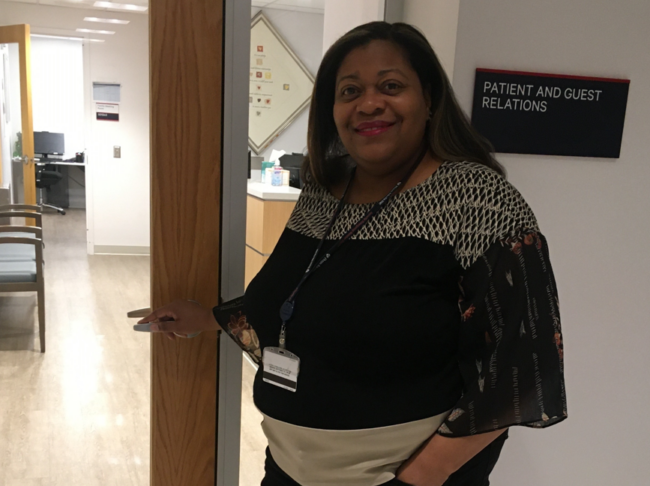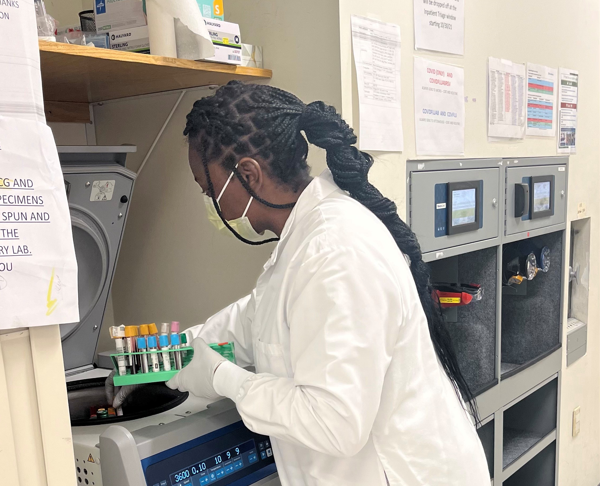

The beginning of the COVID-19 pandemic in 2020 was an especially difficult time for Antoinette Moore. Besides just the uncertainty about a brand-new virus and its ramifications—masks and social distancing, normal ways of doing everyday things upended—she’d been laid off months before from her job at a community organization working with young children and was doing “odds and ends” to pay the bills.
But luckily, she was on the e-mail list for the West Philadelphia Skills Initiative. Thus began a four-year journey in which Moore began, and continues to grow, her career at Penn Medicine.
The Skills Initiative is a workforce development program run as a partnership between the University City District (UCD) community group and major area employers, including Penn Medicine and the University of Pennsylvania, who have committed to develop career opportunities for local residents.
Moore noticed an e-mail about applying to a lab assistant program that was helping the health system staff up its COVID testing and sample processing capacity while helping unemployed people like herself, just one day before the deadline, and it changed her life.
After weeks of virtual classes and limited in-person training, Moore performed COVID tests on the Penn campus and then transitioned to working in the blood bank. “I wanted to be helpful, and I loved learning so much,” she said.
More than three years later, Moore is still at Penn Medicine, and still learning. Her story is a perfect example of the “win-win” nature of Penn’s partnership with the Skills Initiative.
The secret to success
The idea is simple: People in West Philadelphia, an area of the city with high rates of poverty and un-/under-employment, need good jobs that pay well and can evolve into careers; and organizations like the University of Pennsylvania Health System need well-trained frontline employees who are dedicated to their work and motivated to succeed. Participants in the program have been out of work for an average of 30 weeks; most are Black and fewer than one-third have post-high school education or training. The Skills Initiative helps recruit the right people for the open entry-level positions and assists with onboarding, professional development skills, and job coaching. Other employers who partner with UCD to facilitate job placements through the Skills Initiative include the University of Pennsylvania, Children’s Hospital of Philadelphia, SEPTA, and Drexel University.
Overall, the Skills Initiative results are noteworthy:
- Since its founding in 2011, the program has worked with 1,744 job seekers, placing 93 percent of them.
- At the one-year mark, more than 85 percent of successfully placed employees are still at their jobs.
- In 2023, participants in the program saw their hourly wages increase to an average of almost $20.
It’s achievements like these that recently earned UCD an unrestricted $4 million gift from philanthropist MacKenzie Scott, to accelerate and expand the Skills Initiative’s efforts.
On Penn Medicine’s side, the numbers are equally impressive. Take as an example the COVID lab assistant project in which Moore participated. Of the 50 individuals that the Skills Initiative placed with Penn during that wave of recruitment, 21 are still employed with the health system, and 15 have been hired into other roles. The partnership “allows us to provide solid job opportunities with good pay and good benefits to individuals from the community who are raising their hands, who see the ability to give back to the community and help our patients,” said Jennifer TerMaat, MSHRD, PHR, SHRM-CP, associate chief human resources officer for Corporate Services.

Pathway to Promotion
The Skills Initiative’s career-building expertise doesn’t end when Penn Medicine employees start their careers. The Pathway to Promotion program helps employees looking to take the next step. Staff receive career guidance from Penn Medicine Talent Acquisition members and, like those in the recruitment program, complete formal professional development training from the Skills Initiative outside of their normal working hours. Since 2021, more than 100 employees have completed the program.
One of the Pathway to Promotion graduates is Tan’Nette Grandberry. She had been working for over a decade as a unit clerk in Endoscopy at Penn Presbyterian Medical Center—and was thinking about shifting her career to a role in Patient Experience when the pandemic hit. Like many employees, she was temporarily redeployed to a different job function, in her case serving as an elevator operator.
“My manager said that was run by the people who do patient and guest relations, and that it would give them a chance to get to know me,” Grandberry said. “She thought it would be a good move for me.”
Based on this experience, Grandberry decided to transition to Patient Experience, and enrolled in the first cohort of Pathway to Promotion to hone her existing skills, develop new ones, and take advantage of the Skills Initiative’s career counseling and networking opportunities.
Grandberry’s career coach had a day job working with first-generation college students, as well as high school students, on college and job readiness. So she was well equipped to mentor Grandberry through her transition to a role which involved more responsibility and leadership qualities. “She knew about the challenges for people trying to advance, so that helped.”
Fast forward a few years and Grandberry is now a patient experience coordinator for the Oncology service line. Whereas in her previous role she assisted clinical staff and patients on one unit, her current job responsibilities include multiple entities across the health system. Drawing on her skillset in problem solving, Grandberry appreciates having more autonomy as she works to resolve patients’ concerns and complaints, shares their compliments, and even assists with their nonclinical needs like parking and meals when they can’t afford these necessities. “Sometimes it’s a humbling experience,” she said, “but I’m happy to be here and to be able to help.”
Grandberry credits Pathway to Promotion for setting her up for her continued success.
“They give you the necessary tools and nothing but support,” she said. “Everybody’s attention is on you so that you can be the best you that you can be.”
When Grandberry heard about the recent $4 million donation to the Skills Initiative, she e-mailed the organization to congratulate them. “This is great to see the donation, because people in the community need assistance,” she said. “For someone to believe in the Skills Initiative the same way they believed in us is phenomenal.”
Expansion plans
The investment in the Skills Initiative comes at a time when Penn Medicine is looking for even further opportunities to work closely with the program. “We want to continue to grow the partnership because the volume of candidates we need is bigger than what the Skills Initiative is resourced to support,” said Vice President for Talent Acquisition Alexandra Jorgensen. “Scale is the barrier that needs to be overcome.”
For instance, in addition to ongoing work recruiting staff for the Access Center and other departments, the Skills Initiative is working with the health system as well as the Community College of Philadelphia (CCP) to recruit 10 patient care techs (PCTs) at Pennsylvania Hospital (PAH). This initiative is on track to expand to all three Philadelphia hospitals (PAH, HUP, and Penn Presbyterian Medical Center), with two more cohorts of 15 new employees (both PCTs and certified nursing assistants) each. Participants will go through a 12-week skills program, take an accreditation course at CCP, and sit for the state’s nurse aide exam—all at no cost to them.
“The collaborative partnership with the Skills Initiative and the Community College of Philadelphia to connect our community to jobs is especially important as baby boomers in clinical roles retire and Penn Medicine expands its services to patients at multiple hospitals and outpatient areas in the region,” said Rhonda Zaleski, RN, BSN, MS, SPHR, regional director of Corporate Talent Acquisition for Philadelphia and Penn Medicine at Home. The goal is to ensure that staff hired for direct patient care roles are well-trained and supported to achieve certifications necessary for their jobs, which gives them a solid grounding to launch their Penn Medicine careers.
Jorgensen thinks that both aspects—giving valuable work opportunities to well-trained people in underserved communities and helping them advance further once they’re here—are imperative for Penn Medicine. “It is critical for us to partner with our communities to establish meaningful workforce development programs to ‘grow the talent,’ both within the community and [among] our own employees,” she said.

“I ended up finding a purpose”
TerMaat, who had a big hand in getting the initial Skills Initiative projects off the ground, is proud not only of how well they have served Penn Medicine and the community, but also how staff have really taken advantage of them. “These are really employees that are committed not only to advancing their careers internally at Penn Medicine, but also to themselves,” she said. “It really speaks to their internal drive to advance themselves.”
For proof, look no further than Moore.
As COVID testing wound down, she began to contemplate her next move. Once again, with just one day before the deadline, Moore learned about and immediately applied for a spot in Pathway to Promotion—and once again, she got in. Now she’s a lead technician in the HUP lab, working the overnight shift and overseeing the processing of samples for everything from routine inpatient care and testing to pathology to transplants. And she’s having the time of her life.
“What I like about the role is the constant learning,” she said. That includes all the different tests, what they’re for, how to run them, and what to do on a night when seemingly a zillion samples come in and a track breaks down. (Answer: She learns to fix it, and stores the how-to info in a big red binder that her coworkers jokingly call “Antoinette’s lab bible.”)
Moore also marvels about how far her Penn career story—with the help of the Skills Initiative—has come. Out of work and hired amid a desperate need for COVID testing staff, she said, “I ended up finding a purpose within it.” Moore is interested in continuing her education and getting involved in research projects for conditions like COVID. “I’m in it now,” she laughed. “I want to go to the next step.”








